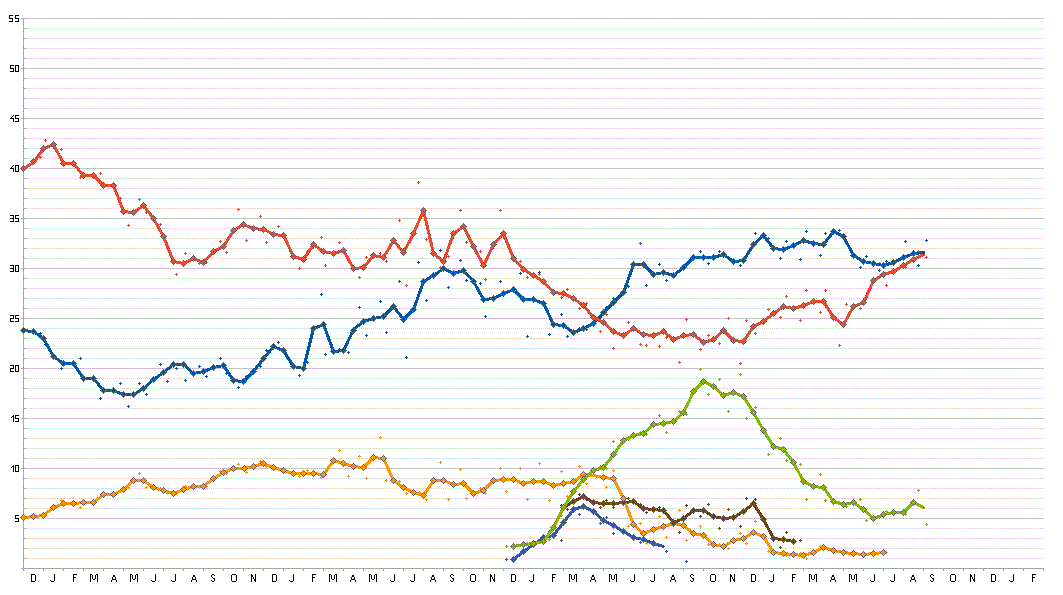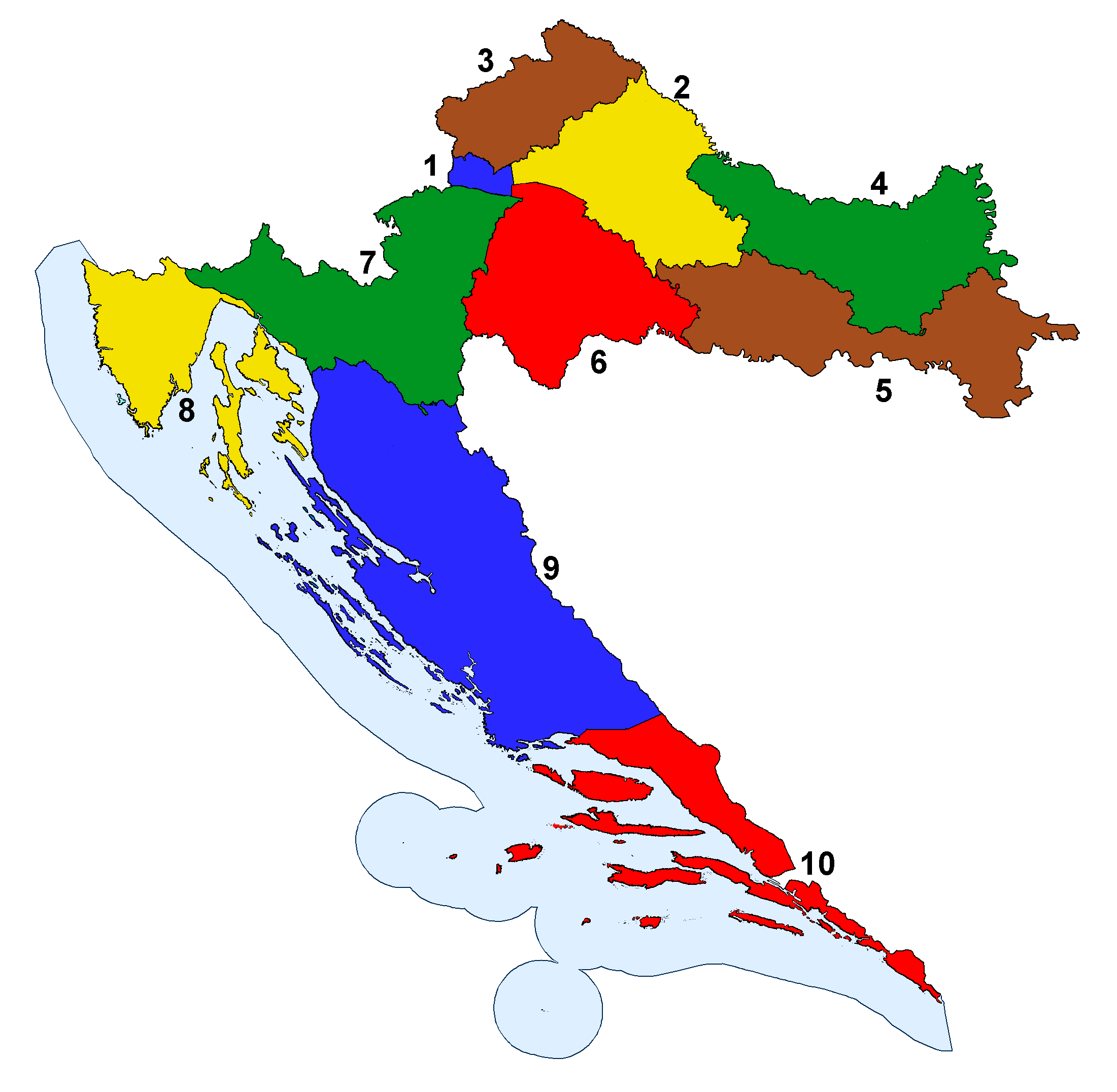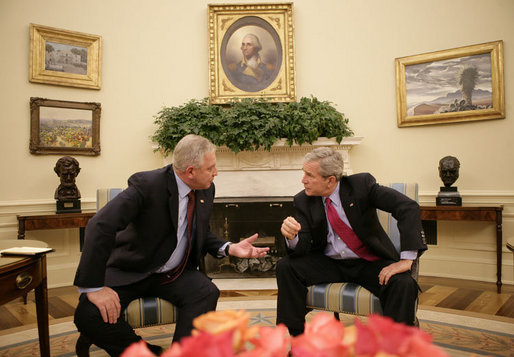|
Croatian Democratic Assembly Of Slavonia And Baranja
Croatian Democratic Alliance of Slavonia and Baranja ( hr, Hrvatski demokratski savez Slavonije i Baranje or HDSSB) is a regionalist, National conservatism political party in the Eastern Croatian region of Slavonia. Until 2015, the HdSSB was considered right-wing populist. It was formally founded on 6 May 2006, but had its origins one year earlier, when the group of local Croatian Democratic Union (HDZ) politicians, led by War of Independence veteran Branimir Glavaš, launched a political organisation with a very similar name, the Croatian Democratic ''Assembly'' of Slavonia and Baranja ( hr, Hrvatski demokratski sabor Slavonije i Baranje) at the eve of May 2005 local elections. The stated aim of new group was the regional reorganisation of Croatia in order to improve conditions in Slavonia, which was - according to Glavaš and his supporters - neglected by central government in Zagreb. The HDZ leadership under Ivo Sanader denounced that platform and ejected Glavaš out of the ... [...More Info...] [...Related Items...] OR: [Wikipedia] [Google] [Baidu] |
Branimir Glavaš
Branimir Glavaš (born 23 September 1956 in Osijek) is a Croatian former major general and right-wing politician. He was one of the founders of the Croatian Democratic Union (HDZ) party which was in power in the 1990s and one of its key figures until a split in 2006. In 2009 he was found guilty of war crimes. Glavaš came to prominence in his home city of Osijek in eastern Croatia during the 1991–95 war of independence when he led its defense and attained the rank of major general in the Croatian Army. After the war he continued to exercise much influence as one of the leading members of Croatian Democratic Union (HDZ). In 2005, Glavaš was charged with war crimes at a Croatian court; he left HDZ and founded a new party – the Croatian Democratic Assembly of Slavonia and Baranja (HDSSB). After a lengthy and controversial trial, during which he was re-elected to parliament and had to be stripped of immunity twice, in 2009 he was found guilty of torture and murder of Serb ci ... [...More Info...] [...Related Items...] OR: [Wikipedia] [Google] [Baidu] |
List Of Political Parties In Croatia
This article lists political parties in Croatia. Croatia has a multi-party system with numerous parties that must collaborate to form coalition governments; a party rarely has a chance of gaining power alone. Between January 1990 (when political parties were legalized in Croatia) and May 2022, 391 political parties were registered, out of which 224 have since been struck from the register. Modern parties Political parties with elected representation at the national level Political parties with previously elected representation at a national level * Alliance of Primorje-Gorski Kotar (''Primorsko-goranski savez'' or PGS) – won 1 seat in 1992 (then called Rijeka Democratic Union or RiDS) – won 1 seat in 1995; 2 seats in 2000; 1 seat in 2003 * Croatian Christian Democratic Union (''Hrvatska kršćanska demokratska unija'' or HKDU) – won 1 seat in 1995, 1 seat in 2000 * Croatian Civic Party (''Hrvatska građanska stranka'' or HGS) – won 3 seats in 2011 * Croatian Demo ... [...More Info...] [...Related Items...] OR: [Wikipedia] [Google] [Baidu] |
Croatian Conservative Party
The Croatian Conservative Party ( hr, Hrvatska konzervativna stranka or HKS) was a conservative political party in Croatia. Last president of the party was Marijan Pavliček. It was founded on 20 November 2014. It joined the Alliance of European Conservatives and Reformists (now Alliance of Conservatives and Reformists in Europe) in May 2015. Its sole MEP has been a member of the European Conservatives and Reformists since the party's foundation. On October 2, 2021, a unification assembly was held in Croatia's capital Zagreb. During the assembly it was announced, that three smaller conservative and right-wing parties (Croatian Conservative Party, Hrast-Movement for Successful Croatia and the Generation of Renewal) will become defunct Defunct (no longer in use or active) may refer to: * ''Defunct'' (video game), 2014 * Zombie process or defunct process, in Unix-like operating systems See also * * :Former entities * End-of-life product * Obsolescence Obsolescence ... [...More Info...] [...Related Items...] OR: [Wikipedia] [Google] [Baidu] |
2016 Croatian Parliamentary Election
Parliamentary elections were held in Croatia on 11 September 2016, with all 151 seats in the Croatian Parliament up for election. The elections were preceded by a successful motion of no confidence against Prime Minister Tihomir Orešković and his cabinet on 16 June 2016, with 125 MPs voting in favour of the proposal. A subsequent attempt by the Patriotic Coalition to form a new parliamentary majority, with Minister of Finance Zdravko Marić as Prime Minister, failed and the Parliament voted to dissolve itself on 20 June 2016. The dissolution took effect on 15 July 2016, which made it possible for President Kolinda Grabar-Kitarović to officially call for elections on 11 September 2016. These were the ninth parliamentary elections since the 1990 multi-party elections. The elections were contested by the two largest parties in the outgoing eighth Parliament; the Croatian Democratic Union (HDZ), led by Andrej Plenković, and the Social Democratic Party (SDP) led by Zoran Milanovi ... [...More Info...] [...Related Items...] OR: [Wikipedia] [Google] [Baidu] |
2015 Croatian Parliamentary Election
Parliamentary elections were held in Croatia on 8 November 2015. All 151 seats in the Parliament were up for election. This parliamentary election was the 8th since the first multi-party election in 1990 and the first since Croatia joined the European Union in 2013. The ruling center-left Croatia is Growing coalition, led by Prime Minister Zoran Milanović, was challenged by the center-right Patriotic Coalition led by the HDZ and headed by its party chairman Tomislav Karamarko, and also faced several new political coalitions. The elections produced a hung parliament, with the ruling Croatia is Growing coalition winning 56 seats in the 10 electoral constituencies within Croatia and 3 of the 8 representatives of national minorities (Ermina Lekaj-Prljaskaj and Veljko Kajtazi are members of HNS and Sándor Juhász is a member of SDP). The opposition Patriotic Coalition won 56 seats within Croatia and all three seats allocated to Croatian citizens living abroad, winning 59 seats, t ... [...More Info...] [...Related Items...] OR: [Wikipedia] [Google] [Baidu] |
Alliance For Croatia
Alliance for Croatia ( hr, Savez za Hrvatsku) was a right-wing electoral alliance in Croatia. The aim of the coalition was the joint appearance of smaller right-wing parties in the 2014 European Parliament elections and 2014–2015 Croatian presidential elections. The coalition was dissolved in 2015. The coalition consisted of: * Croatian Democratic Alliance of Slavonia and Baranja * Croatian Party of Rights * Croatian Dawn – Party of the People * Authentic Croatian Peasant Party * Family Party * Action for a Better Croatia * A Vow for Croatia * Croatian Growth dissidents In the European Parliament elections in 2014 the coalition received 6.88% of the vote. Although they passed the threshold of 5%, they did not win a seat. In the presidential elections later that year, their candidate Milan Kujundžić Milan Kujundžić (; born 27 April 1957) is a Croatian physician and politician who served as Minister of Health in the Cabinet of Andrej Plenković between 20 ... [...More Info...] [...Related Items...] OR: [Wikipedia] [Google] [Baidu] |
2011 Croatian Parliamentary Election
Parliamentary elections were held in Croatia on Sunday, 4 December 2011 to elect 151 members to the Croatian Parliament. They were the sixth parliamentary election in Croatia since independence. Elections were held in 10 electoral districts inside Croatia (each electing 14 members of parliament), one electoral district for Croatian citizens living abroad (3 members of parliament), and one electoral district for national minorities (8 members of parliament). Candidate lists have to win more than 5% of the votes in an electoral district in order to be represented in Parliament. The previous elections were a close race between the two major political alliances and resulted with Ivo Sanader winning a second term as Prime Minister. After his sudden and unexpected resignation in mid-2009, Jadranka Kosor succeeded him as head of the governing party (Croatian Democratic Union, HDZ) and formed a new Government. Zoran Milanović, despite losing a close race four years ago, was again chose ... [...More Info...] [...Related Items...] OR: [Wikipedia] [Google] [Baidu] |
Croatian Parliament
The Croatian Parliament ( hr, Hrvatski sabor) or the Sabor is the unicameral legislature of the Republic of Croatia. Under the terms of the Croatian Constitution, the Sabor represents the people and is vested with legislative power. The Sabor is composed of 151 members elected to a four-year term on the basis of direct, universal and equal suffrage by secret ballot. Seats are allocated according to the Croatian Parliament electoral districts: 140 members of the parliament are elected in multi-seat constituencies. An additional three seats are reserved for the diaspora and Croats in Bosnia and Herzegovina, while national minorities have eight places reserved in parliament. The Sabor is presided over by a Speaker, who is assisted by at least one deputy speaker (usually four or five deputies). The Sabor's powers are defined by the Constitution and they include: defining economic, legal and political relations in Croatia, preservation and use of its heritage and entering into alli ... [...More Info...] [...Related Items...] OR: [Wikipedia] [Google] [Baidu] |
2007 Croatian Parliamentary Election
Parliamentary elections were held in Croatia on 25 November 2007 and for overseas voters on 24 and 25 November.President announces elections The campaign officially started on 3 November. The announced elections on 17 October and 14 days were allowed for candidate lists to be submitted. Elections were held in 10 electoral districts inside Croatia (each providing 14 members of parliament), [...More Info...] [...Related Items...] OR: [Wikipedia] [Google] [Baidu] |
Osijek-Baranja County
Osijek-Baranja County (, hr, Osječko-baranjska županija, hu, Eszék-Baranya megye) is a county in Croatia, located in northeastern Slavonia and Baranja. Its center is Osijek. Other towns include Đakovo, Našice, Valpovo, Belišće, and Beli Manastir. History Osijek-Baranja County was established in 1992, with border changes in 1997. Stifolder The ''Stifolder'' or ''Stiffoller Shvove'' are a Roman Catholic subgroup of the so called Danube Swabians. Their ancestors once came ca. 1717 - 1804 from the Hochstift Fulda and surroundings (Roman Catholic Diocese of Fulda), and settled in the Baranja area, such as in Jagodnjak, etc. They retained their own German dialect and culture, until the end of WW2. After WW2, the majority of Danube Swabians were expelled to Allied-occupied Germany and Allied-occupied Austria as a consequence of the Potsdam Agreement. Only a few people can speak the old Stiffolerisch Schvovish dialect. A salami is named after this people. Administrative di ... [...More Info...] [...Related Items...] OR: [Wikipedia] [Google] [Baidu] |
Ivo Sanader
Ivo Sanader (born 8 June 1953) is a former Croatian politician who served as Prime Minister of Croatia from 2003 to 2009. He is to date the second longest-serving prime minister since independence, holding the office for over five and a half years before resigning in July 2009. He is one of only two Croatian prime ministers (along with Andrej Plenković) who have served more than one term, winning general elections in 2003 Croatian parliamentary election, 2003 and 2007 Croatian parliamentary election, 2007. He is also, along with Ivica Račan and Plenković, one of the three prime ministers who have been at the head of more than one government cabinet, chairing his Cabinet of Ivo Sanader I, first cabinet from 23 December 2003 until 12 January 2008, and his Cabinet of Ivo Sanader II, second cabinet from 12 January 2008 until his resignation on 6 July 2009. Sanader obtained his education in comparative literature in Austria, where he also worked as a journalist, in marketing, publi ... [...More Info...] [...Related Items...] OR: [Wikipedia] [Google] [Baidu] |
Zagreb
Zagreb ( , , , ) is the capital (political), capital and List of cities and towns in Croatia#List of cities and towns, largest city of Croatia. It is in the Northern Croatia, northwest of the country, along the Sava river, at the southern slopes of the Medvednica mountain. Zagreb stands near the international border between Croatia and Slovenia at an elevation of approximately above mean sea level, above sea level. At the 2021 census, the city had a population of 767,131. The population of the Zagreb urban agglomeration is 1,071,150, approximately a quarter of the total population of Croatia. Zagreb is a city with a rich history dating from Roman Empire, Roman times. The oldest settlement in the vicinity of the city was the Roman Andautonia, in today's Ščitarjevo. The historical record of the name "Zagreb" dates from 1134, in reference to the foundation of the settlement at Kaptol, Zagreb, Kaptol in 1094. Zagreb became a free royal city in 1242. In 1851 Janko Kamauf became Z ... [...More Info...] [...Related Items...] OR: [Wikipedia] [Google] [Baidu] |






